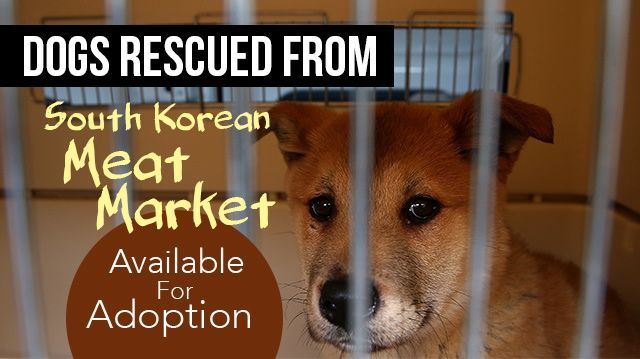
Dogs rescued from the hell of a South Korean dog meat market are now safe in the United States and available for adoption. Of the 250 dogs saved from the Wonju, South Korea, dog meat operation, about 120 are being sponsored by St. Hubert’s Animal Welfare Center in Madison, New Jersey, and will soon become part of a loving family rather than someone’s dinner. After vaccinations, spaying and neutering, and treatment of any health issues, the dogs will head to shelters in the Northeast for adoption.
South Korean dog meat trade
The vast majority of South Koreans do not consume dog meat. While the number of South Koreans eating dog meat remains relatively small, the demand leads to the killing of approximately two million canines in the country annually — more than 100,000 tons of canine meat. The “dog days” of summer take on new meaning here, as there is a cultural belief among some South Koreans that eating dog helps keep people cool during the season’s brutal heat.
Officially, serving dog in restaurants is banned in South Korea. In reality, such restaurants are not hard to find, even in the capital, Seoul. Animal welfare advocates estimate as many as 20,000 such establishments exist throughout the country.
Other Asian countries
Dog meat is eaten in other Asian countries, but there is a difference in the practice in South and North Korea. In China, Vietnam and other countries, dog meat may be on the menu, but the victims are strays or street dogs. Only in South and North Korea are dogs raised specifically for the meat trade.
Dog meat farms
Farms raising animals for the dog meat trade exist throughout South Korea. It is from one such farm that these 250 dogs were rescued by the Humane Society International, and the farmer has stated he is giving up the dog meat trade. Dogs raised especially for meat are typically large yellow mongrels, but former pets also find their way to slaughter. A Wall Street Journal reporter describes a 2015 visit to a dog meat farm that included cages containing beagles, English setters, a poodle, and Jindos — hunting dogs originating from South Korea. Even though the Jindo is listed as number 53 of Korea’s national treasures and supposedly safeguarded under the country’s Cultural Properties Protection Act, these dogs still end up in stews and soups.
Terror before death
Some defend dog meat eating as part of South Korean culture, and point to Western consumption of cattle, pigs, sheep and other livestock. However, the methods of killing stand in stark contrast. In the West, the law requires that animals raised for human consumption are slaughtered as humanely as possible. That’s not the case in South Korean dog meat operations. South Korea does have standards regarding the slaughter of livestock, but does not consider dogs livestock, according to the Wall Street Journal. The dog meat trade is completely unregulated.
Because of a belief that high adrenaline levels in the animal produce better meat, dogs are terrorized prior to killing and death is not swift. Dogs may suffer hanging, electrocution, or may be beaten to death — in view of other dogs about to endure the same fate.
Generational change
The good news is that younger South Koreans have less interest in consuming man’s best friend. The keeping of pet dogs and cats — felines are also eaten — has increased substantially, with roughly 20 percent of South Korean households owning a pet. South Korea also has a thriving puppy mill business, but those purebred dogs kept in poor conditions aren’t bred for the meat trade. The Wall Street Journal reports that a 2014 poll of South Koreans under the age of 20 found that about 66 percent seldom ate dog meat. However, that still means one-third of young South Koreans do sometimes eat dog.
How to help
The Animal Welfare Institute (AWI) notes that South Korea’s hosting of the 2018 Winter Olympics is a prime opportunity to focus international attention on the dog meat trade. The AWI urges animal advocates to send letters protesting the dog meat trade to the South Korean Ambassador to the US, South Korean President Lee Myung-bak, and the United Nations Secretary General Ban Ki-Moon.
—Jane Meggitt
Jane Meggitt graduated from New York University and worked as a staff writer for a major New Jersey newspaper chain. Her work on pets, equines and health have appeared in dozens of publications, including The Daily Puppy, The Nest Pets, Horse News, Hoof Beats and Horseback magazines.
Sources:
http://patch.com/new-jersey/madison/120-dogs-rescued-s-korean-meat-market-headed-nj-adoption-0
https://awionline.org/dogmeat
http://www.hsi.org/issues/dog_meat
http://blogs.wsj.com/korearealtime/2015/03/21/dogs-saved-from-south-korean-dinner-plates-by-u-s-animal-welfare-group
http://barkpost.com/jindo-dog-facts

